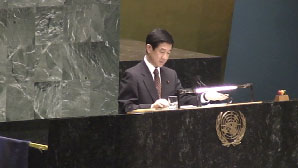Statement by H.E. Mr. Shintaro Ito
Vice-Minister for Foreign Affairs of Japan
On the occasion of United Nations Conference to Review Progress Made in the Implementation of the Programme of Action to Prevent, Combat and Eradicate the Illicit Trade in Small Arms and Light Weapons in All Its Aspects
26 June 2006
United Nations, New York

Mr. President
Distinguished delegates
I extend my heartfelt congratulations to His Excellency Ambassador Prasad Kariyawasam, on his assumption of the presidency. On behalf of the Government of Japan, I am greatly honored to address this milestone conference on small arms and light weapons.
(The necessity to address SALW problems)
Mr. President
Illicit small arms and light weapons are a humanitarian threat to people's lives and security; the international community must cooperate to eradicate such weapons. During my official trip to Liberia this January I visited a Japanese-sponsored UNICEF vocational center. I remember one happy boy, telling me how enthusiastically he was learning to become a carpenter there. He had been a child soldier. What this child should have learned is how to use carpenter's tools, not weapons - how to build and create, not how to destroy and kill. To protect people from the threat of small arms, we must strive to make this conference a complete success.
Mr. President
In the five years since the adoption of the Programme of Action on Small Arms and Light Weapons, we have much to be proud of with the progress at the national, regional and global levels. The Programme of Action has demonstrated its effectiveness as a comprehensive normative guideline against illicit small arms. Furthermore, civil society has taken significant actions. However, many issues still remain to be addressed.
(Japan's contributions and achievements since 2001)
Mr. President
Up until now, Japan has promoted international rule-making efforts and on-the-ground projects. UN draft resolutions on small arms submitted by Japan, Colombia and South Africa have laid out a concrete roadmap for global endeavor. Japan also sent Dr. Kuniko Inoguchi, former Ambassador to the Conference on Disarmament, as the chairperson of the First Biennial Meeting. Over the past five years we have also extended 270 million US dollars supporting projects in affected countries.
(Japan's SALW policy, follow up of the Conference)
Mr. President
For the rule-making process, Japan will continue to contribute towards a concrete outcome of this Conference. The Final Document should stress the importance of transfer control on small arms. I am very proud that Japanese small arms and light weapons are not being used in conflicts around the world, as we do not export weapons to other countries. The global community should try to develop international standards on transfer control. To maintain its effectiveness the Final Document must engage the major small arms exporting countries.
In this regard, Japan understands the Arms Trade Treaty initiative aims to strengthen control over the transfer of conventional weapons. Such an initiative is principally in line with Japan's basic position.
Mr. President
For future implementation of the on-the-ground projects, Japan places its highest priorities on the following three areas.
First, we will promote institution and capacity building for small arms control.
Rules internationally agreed upon must be steadily implemented in each country. For that purpose, we will assist small arms affected countries in enhancing their ownership, for example, through improving legislative frameworks and enhancing law enforcement capabilities of relevant authorities.
Second, we will also give closer attention to individuals and local communities affected by conflict.
In conflicts where small arms are employed, many people, including child soldiers and women, as well as communities suffer adversely. Even post conflict, the illicit circulation of small arms still poses a residual threat to individuals. To ensure human security, Japan will support their efforts in the collection of illicit weapons as well as the smooth reintegration of demobilized soldiers and assistance to their families and communities.
Third, we will search for more effective ways and means of assistance.
I believe the best practices of implemented projects, including the experiences of the NGOs active on the ground, should be further shared internationally. Moreover, deepening our knowledge of demand factors by addressing such fundamental questions as "why do people possess weapons illicitly," would be valuable for formulating more effective projects.
Mr. President
Based on this policy, Japan intends to utilize its available schemes. For example, we will support African countries, through a part of the 122 million US dollars in Grant Aid for Conflict Prevention and Peace Building. Regarding the Asian region, we will also use the 70 million US dollars Japan-ASEAN Integration Fund, established this March which, among other things, emphasizes the fight against terrorism.
Furthermore, we will hold a Tokyo Workshop next year focusing on international assistance, including best practices of small arms projects and demand factors, as a follow-up to the discussions at this conference.
(Conclusion)
Finally, Mr. President
Last year Secretary General Kofi Annan deplored two failures, namely the lack of agreement on substantive issues at the NPT Review Conference and the elimination of references to nuclear disarmament and non-proliferation in the 2005 World Summit Outcome. To recover from this situation, the success of this Conference is imperative. The international community must redouble its efforts to solve this problem. I am confident that the Conference will issue robust and clear Final Document enabling us to go a concrete way forward. Japan is determined to strive for the elimination of the scourge of small arms and light weapons.
Mr. President
Let us overcome small national interests. By pursuing global interests, we will be able to achieve our ultimate objective of peace and security for all. Let us dream of creating a better future. There is a truth: dreams can never be killed by guns.
![]() Related Information (Small Arms and Light Weapons)
Related Information (Small Arms and Light Weapons)
![]() Permanent Mission of Japan to the United Nations Official Web Site
Permanent Mission of Japan to the United Nations Official Web Site ![]()
Back to Index
